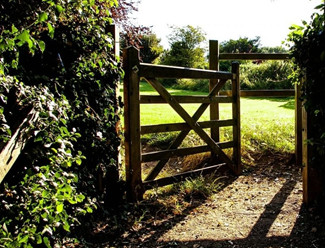Throughout the Gospels, we are continually accompanying Jesus on his "way to Jerusalem." As we make our way on this spiritual journey, we too must inevitably ask the question posed in today's gospel: "Lord, will we be among those who are saved? Are we among those who will make this journey successfully?" And Jesus answers our question with words that dispel any false ideas that we may have been entertaining: "Strive to enter through the narrow gate." And as he does so often, Jesus uses a parable to shake us out of our comfort zone and question our complacency.
 To love and to live as He did will not be easy.
To love and to live as He did will not be easy.
In Jesus’ world, as in our own, there were “insiders” and “outsiders.” A person would be an insider by their birth into a family or group. Or, one might become part of the family/group by being invited to join with others around the table. But in the parable, Jesus talks about the people who are worried that they are being excluded, those who need to “prove” they are part of the group - “we ate and drank with you, and you taught in our streets.” However, more is required.
Earlier in the Gospel he says quite plainly, that repentance, a change in the direction of one’s life, is required. The question back to them is, “Yes, you did all of that but did you follow my teachings and change your life?” Simply being a part of the group or calling oneself a follower of Jesus are not enough. Our lives must be marked by the life, death and resurrection of Jesus. We are given the gift of forgiveness but a subsequent change of life is expected as a response.
The voice of the parable may sound stern, but the intention is to keep us from complacency and prevent us from falling into the trap of judging others, of feeling that we are better than others. Passing judgment is a distraction for the disciple. So is complacency. Such a relaxed attitude can cause us to go into “automatic pilot” and just cruise along. Doing this we risk losing a sense of the living and energizing Spirit who feeds and nourishes the involved disciple.
The people who are most alive and energetic, those who are sensitive and responsive to the world around them are those who have rolled up their sleeves and have become fully engaged in the daily work God has given them to do. We are called to minister to all of God's people - and we must ask ourselves, through all of our activity: "Who are we? Why are we gathering, why are we teaching, why are we meeting, why are we praying, why are we serving?
Those who don't belong, will also be asking: "Who are you? What are you about? Why do you do what you do?" Hopefully, everything we say and do will proclaim very loudly and clearly: "We are the hands, the eyes, the heart, and the body of Christ Jesus. We bring His light and truth to our world. In His name, and by His power, we are trying to remake the face of the earth, to renew our world, to overcome evil and suffering, to restore all things in Him."
People need to see us as a group of believers dedicated totally to hastening the coming of the kingdom of God. We must be recognized as peacemakers, as instruments of God's compassion and mercy. We must be known as people who not only pray together but also as people who work together for justice, who feed the poor, who are concerned about the homeless, who fight to save our young people from addiction to drugs and alcohol, who defend the quality of our environment, the sanctity of life and the dignity of all men and women.
The place God has reserved for the just is large and spacious. There the tables are straining under the weight of the choicest food and drink. There the rich and those invited in from the byways, dine at the same table as equals. There those who think they are first are last, and those who have been always treated as last, now are first. The admission is free, but the narrow gate requires a change in our lives and serious shifts in priorities concerning what we do and whom we call important.





